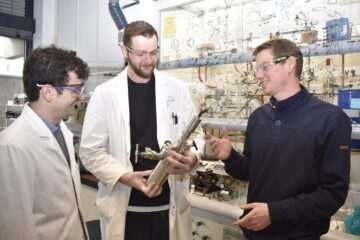Do oestrogen levels affect the willingness to share?

Fluctuating hormone levels change a woman's social behaviour over the course of the menstrual cycle. Mood swings and irritability before the period as well as a greater interest in sex during ovulation are well known.
Now psychologists at the Goethe University have discovered that the willingness to share one's own resources with strangers also fluctuates with hormone levels. Women exhibit a higher willingness to cooperate during and shortly after menstruation – this is the result of two online studies involving over 400 German and US American women.
To qualify for the study, the participants had to have a natural menstrual cycle, in other words not be using hormone-based contraceptives, had to not be pregnant and not have entered menopause yet. The researchers compared the willingness to cooperate between women in the time during and shortly after menstruation (early follicular phase), when the levels of the hormones oestrogen and progesterone are low, and a few days after ovulation (midluteal phase), when the oestrogen and progesterone levels are especially high. The hormone levels were estimated based on the self-reported day in the cycle.
The researchers measured the subjects' individual willingness to cooperate using a well-established psychological scale, the “Social Value Orientation”. To do so, they asked the women to divide fictitious money between themselves and another person who was a complete stranger to them.
“Numerous studies have shown that people who exhibit a high willingness to share in this test also donate money more often and in larger amounts in real life, take the train instead of the car to work more often and are more willing to compromise in negotiations than people with a less pronounced pro-social value orientation”, Christine Anderl, lead author of the study, explains.
The two studies showed that the women were significantly more inclined to share their own resources with a stranger during and shortly after menstruation than they were a few days after ovulation.
The greater the cycle-dependent level of the “female” sex hormone oestrogen, the lower the willingness to share of the women on a purely statistical basis.
“While we are firmly convinced that the variation in the willingness to share over the course of the cycle is a real and systematic effect, we still have to determine whether or not it is really caused by oestrogen as the present data suggest”, Christine Anderl tells us.
“This matches the findings of other research groups, who were able to show that hormones such as oxytocin and the “male” sex hormone testosterone affect the willingness to cooperate in humans”, Prof. Sabine Windmann from the Institute for Experimental Psychology 2 at the Goethe University commented.
How strongly the cycle-dependent fluctuations in the willingness to cooperate affect the day-to-day life of women and which areas of life are particularly affected by this will have to be researched in further studies.
However, the researchers have already found initial evidence which suggests that the described effects also occur when the subjects are using real money. These results are also interesting in light of hormonal contraception. Little is currently known about how synthetic hormones act on the receptors in the brain and what effect they have on the behaviour of women.
Media Contact
More Information:
http://www.uni-frankfurt.deAll latest news from the category: Health and Medicine
This subject area encompasses research and studies in the field of human medicine.
Among the wide-ranging list of topics covered here are anesthesiology, anatomy, surgery, human genetics, hygiene and environmental medicine, internal medicine, neurology, pharmacology, physiology, urology and dental medicine.
Newest articles

Lower dose of mpox vaccine is safe
… and generates six-week antibody response equivalent to standard regimen. Study highlights need for defined markers of mpox immunity to inform public health use. A dose-sparing intradermal mpox vaccination regimen…

Efficient, sustainable and cost-effective hybrid energy storage system for modern power grids
EU project HyFlow: Over three years of research, the consortium of the EU project HyFlow has successfully developed a highly efficient, sustainable, and cost-effective hybrid energy storage system (HESS) that…

Safer alternative for an explosive reaction
The chemical industry has been using a reaction with explosive chemicals for over 100 years – now Mülheim scientists have discovered a safer alternative. The Ritter Group of the Max…





















